"I can't stand it any longer," Musk raged on the X platform, accusing his own startup, xAI, of filing his own lawsuit for the Nth time.
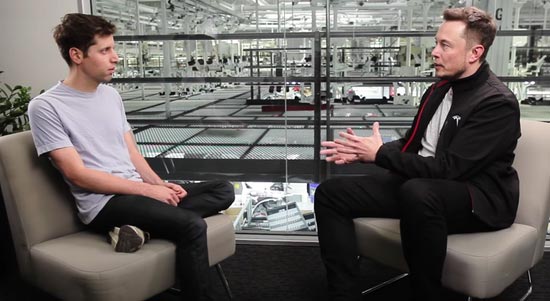
Last week, Musk's artificial intelligence startup xAI filed a lawsuit in the Northern District of California federal court, accusing industry giant OpenAI of systematic and premeditated employee poaching and illegal theft of trade secrets.
This is Musk's sixth lawsuit against OpenAI in the past year and a half. The lawsuit has escalated from California court to federal court, and the allegations have become increasingly serious, ranging from initial breach of contract to unfair competition, monopolistic practices, and theft of trade secrets.
Is this a vindication or an off-the-record tactic to combat competition? Or perhaps both? The court's decision remains to be made. But what is certain is that the competition between the two companies has reached a fever pitch, and it extends beyond product and business competition. More lawsuits are expected.
Accusation of Trade Secret Theft
This time, xAI accuses OpenAI of premeditatedly poaching its core employees, including several with access to the source code for its large-scale Grok model and its data center strategic plans. These technologies could potentially give OpenAI a significant competitive advantage in its products while saving billions of dollars in data center operating costs.
In its lawsuit, xAI alleges a "deeply troubling pattern" and "strategic actions" by OpenAI to deliberately induce these employees to violate confidentiality agreements in an attempt to gain access to xAI's source code, operational advantages from its data center launch, technological advances, and strategic business plans. This was done to gain an unfair advantage in the fierce competition to develop advanced AI.
Musk's comment on the lawsuit was: "I've had enough. I won't tolerate it anymore." He explained on his X platform, "We've sent them multiple warning letters, but they continue to cheat. After exhausting all other avenues, litigation is our only option."
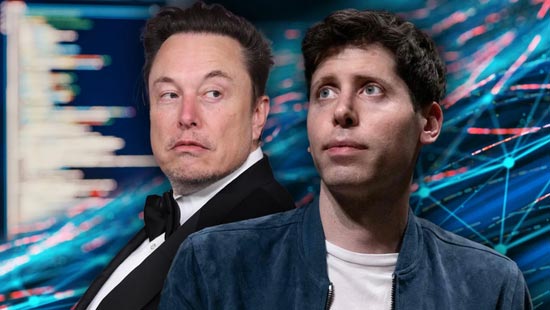
OpenAI clearly disagrees with his allegations. Altman's OpenAI issued a statement denying any wrongdoing, stating that the lawsuit is merely the latest chapter in "Musk's ongoing harassment of OpenAI," all for the benefit of Musk and his own for-profit AI company.
However, xAI detailed its lawsuit against OpenAI, citing three employees poached by OpenAI and allegedly stealing trade secrets. These include two engineers, Xuechen Li and Jimmy Fraiture, who had access to core technology, and a former executive with knowledge of the company's data center strategy. Although his name is redacted in the lawsuit, speculation is that xAI is most likely targeting former CFO Mike Liberatore.
Download the entire codebase
This lawsuit stems from another one filed a month earlier: xAI sued former employee Xuechen Li in late August for illegally stealing trade secrets. The lawsuit alleges that on July 25th, Li Xuechen copied confidential company documents to a personal device and sold company stock for $7 million. Three days later, he resigned from xAI and joined OpenAI on August 19th.
Earlier this month, Musk angrily accused Li Xuechen of downloading xAI's entire codebase before leaving! Login logs confirm this, and he admitted it!
According to LinkedIn, Li Xuechen previously worked at Google and joined xAI after graduating from Stanford with a PhD last year. In just one year, he received stock worth $7 million and a hefty annual salary. The AI industry is incredibly expensive. By comparison, Meta's multi-year contracts worth hundreds of millions of dollars to top technical talent are understandable.
Earlier this month, xAI successfully filed for a temporary restraining order, temporarily barring Li Xuechen from working at OpenAI or any other AI company. It also requires him to hand over all personal devices, cloud accounts, and data storage devices for investigation and to delete all data related to xAI after evidence collection. A formal hearing will be held on October 7th.
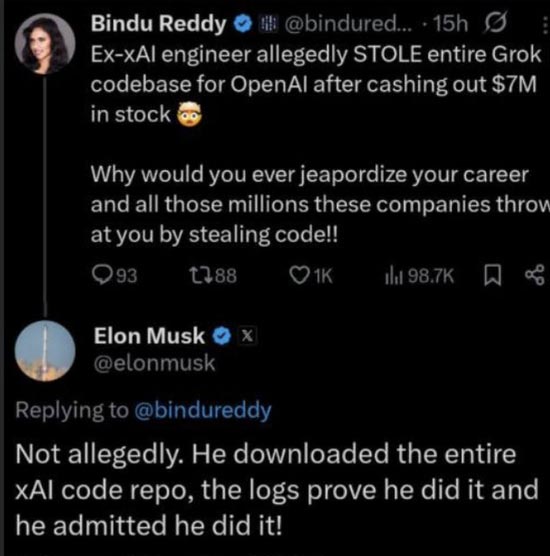
In addition to Li Xuechen, xAI is also suing another engineer, Fletcher, who also copied technical files to a personal device before leaving the company. He also copied the source code for the Grok chatbot and joined OpenAI.
xAI also accuses a finance executive of disclosing key secrets about xAI's data center deployment to OpenAI. The lawsuit alleges that in July of this year, after Musk's lawyers sent a letter accusing him of violating the confidentiality agreement, the former executive responded with a genitalia-related profanity. (Email evidence is available.)
Speculation suggests that the executive in question is xAI's first CFO, Liberatore, as he had recently joined OpenAI. LinkedIn profiles show that before joining xAI, Liberatore spent decades as a managing director at Goldman Sachs and private equity giant KKR, making him a seasoned executive with extensive experience in investment and technology. Given his credentials, it's difficult to understand why he would respond to a formal email from his lawyer using profanity.
Will Musk accept the settlement?
The Tennessee data center is xAI's core competitive advantage. Musk plans to use 100,000 of Nvidia's top-tier GPUs (H100 and next-generation B200) here to build an AI supercomputing cluster with unprecedented computing power. OpenAI, having just announced a $100 billion strategic investment from Nvidia, also plans to build its own supercomputing center. xAI's data center GPU deployment technology is undoubtedly significant. This is one of the reasons for Musk's outburst.
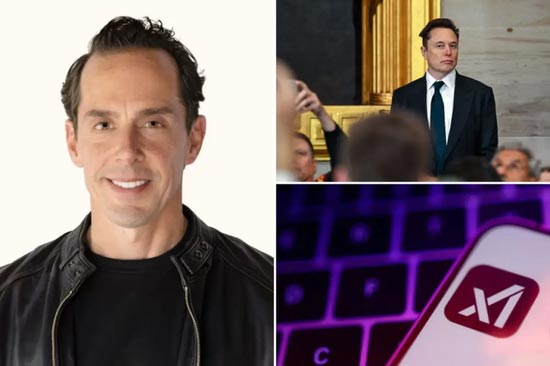
In its lawsuit, xAI alleges that OpenAI violated federal and California state laws. "They clearly resorted to unscrupulous means when threatened by superior innovators, including plundering and misappropriating xAI's technological advances, source code, and business plans." The stolen technology "outperforms ChatGPT and other competing products, potentially saving OpenAI billions of dollars in R&D costs and years of effort."
xAI also cited the recent large-scale model competition between the two parties, accusing OpenAI of "information theft" because Grok models (particularly the newly released Grok 4) rival or even surpass OpenAI's performance, threatening OpenAI's market dominance.
As is customary, the lawsuit will then enter an intensive discovery phase, involving extensive document exchanges and witness depositions. xAI may seek a temporary restraining order or preliminary injunction to prevent former employees from working on specific AI projects at OpenAI or to prohibit OpenAI from using the allegedly stolen trade secrets. Notably, xAI's lead attorney in this lawsuit is the former director of the U.S. Trademark Office.
This lawsuit holds significant implications for both companies. If xAI successfully proves trade secret theft, it could receive substantial damages and an injunction preventing OpenAI from using the allegedly stolen trade secrets or hiring specific former xAI employees, effectively stemming the loss of key employees. If xAI wins the lawsuit, OpenAI could face not only billions of dollars in damages for reputational damage but also injunctions restricting technology development or the hiring of key talent, potentially straining partnerships with companies like Apple and Microsoft.
As such, OpenAI will likely fight this lawsuit with all its might. Typically, high-profile lawsuits like these are more likely to result in an out-of-court settlement, with a compensation payment and a promise not to poach employees, thus avoiding years of litigation and damaging the company's reputation. However, perhaps Musk isn't after money, but a sense of relief.
Greed Induces theft
It's worth noting that this type of lawsuit is commonplace in Silicon Valley. California lacks non-compete agreements, allowing talent to freely switch jobs, a driving force behind Silicon Valley's technological innovation and free competition. In the AI era, the competition for elite talent has intensified, and the cost of poaching has become exorbitant. Giants like Meta have even offered multi-year contracts worth hundreds of millions of dollars to poach employees from OpenAI and Google.
Even without non-compete agreements in California, former employees still have a legal obligation to maintain confidentiality with their former employers. They cannot privately copy technical and business documents from their former employers, nor can they bring trade secrets or technology to new companies, even if they were previously developed.
However, driven by greed, there's no shortage of people who commit theft. In the past few years, tech companies like Google, Apple, and Tesla have repeatedly sued former employees for stealing core technology after leaving their jobs. While most lawsuits have resulted in settlements, many have ended up in jail, ruining their careers.
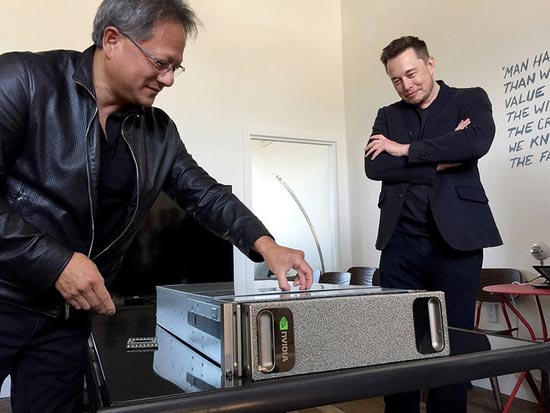
The most notorious example of this is former Google star Anthony Levandowski. As the co-founder of Google's self-driving car project, he earned a lucrative salary of over $100 million at Google, yet he resigned to start his own self-driving car company, which was acquired by Uber for $680 million just six months later. In just six months, he earned several times his entire career.
However, Google soon discovered that Levandowski had downloaded 14,000 documents related to Google's self-driving car engineering, manufacturing, and business operations before leaving, which was a major motivation for Uber to acquire his company. Levandowski was ultimately sentenced to 18 months in prison and three years of supervised residence. In a separate civil lawsuit, Uber paid Google a $250 million settlement. Coupled with the previous self-driving car accident, Uber quickly divested and abandoned its self-driving car project.
On the other hand, xAI's lawsuit against OpenAI marks another escalation in the legal battle between Musk and Altman. These two once like-minded partners have now become one of the most high-profile rivals in the AI industry. On the one hand, they exchanged verbal attacks, and on the other, they engaged in a relentless court battle.
Six lawsuits in a year and a half
Both co-founders of OpenAI shared a common technological vision. In 2015, Musk, along with Altman and other prominent Silicon Valley tech figures, co-founded OpenAI, a nonprofit research organization dedicated to advancing AI research for human safety and sustainability. Musk pledged $1 billion, of which he actually donated $100 million. He also personally recruited and attracted many top talent, including co-founder Ilya Sutskever from Google.
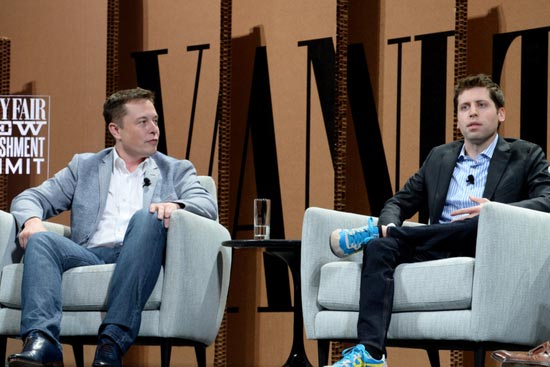
But later, a clear disagreement arose between Musk and the OpenAI board. The board did not support Musk taking over OpenAI's day-to-day operations, given his existing ventures like Tesla and SpaceX. Instead, they supported Altman, who had decided to step down from the tech incubator Y Combinator, becoming full-time CEO. In 2018, feeling left out, Musk withdrew from OpenAI, citing a conflict of interest.
After Altman's departure, OpenAI, under Altman's leadership, transformed itself, establishing a for-profit subsidiary and bringing in strategic investors like Microsoft. This led to the subsequent success of ChatGPT, which ushered in the era of generative AI. However, in Musk's view, OpenAI had betrayed its original purpose as a nonprofit research organization and had become an accomplice of tech giants like Microsoft and Google.
Musk's deep dissatisfaction with OpenAI was the direct motivation for founding xAI: he wanted to personally build an AI giant to defeat OpenAI. Leveraging Musk's immense influence, xAI quickly became one of the fastest-rising upstarts in the AI industry, easily raising funding and attracting a large number of elite talent from Google, OpenAI, and Microsoft.
Less than six months after its founding, xAI released its first large-scale AI model. Just two years after its founding, xAI's latest model, Grok-4, was already on par with ChatGPT across multiple metrics. In its latest round of funding, xAI's post-money valuation reached $200 billion, pushing Musk's personal net worth to over $500 billion.
While competing head-on, Musk hasn't given up on his efforts to target OpenAI through litigation. Since February of last year, he has filed six lawsuits against OpenAI, attempting to prevent it from transitioning to a for-profit company and blocking its strategic partnerships with Microsoft and Apple, hoping to disrupt OpenAI's strategic progress as much as possible.
Just last month, Musk announced he was suing Apple and OpenAI, alleging monopoly power and unfair competitive advantages over other major AI models. Musk wrote on X: "Apple is the gateway to the internet for half of the US population. They are ruthlessly promoting OpenAI in various ways, making it impossible for any other AI company to succeed!" Apple denied the allegations, stating that its App Store operates "fairly and without bias."
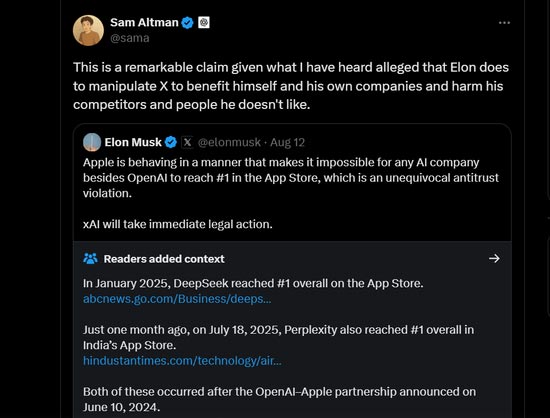
Altman retaliated, saying, "Given all I've heard about Musk's manipulative behavior to benefit X and his companies and to undermine competitors and those he dislikes, this accusation is truly bizarre."
His once-friendly personal relationship with Musk is now gone.
Attached is Musk's six consecutive lawsuits against OpenAI:
- In February 2024, Musk accused OpenAI of "becoming a closed-source de facto subsidiary of Microsoft," violating its nonprofit mission to generate profits.
- In August 2024, Musk amended the lawsuit and refiled it, adding Microsoft as a defendant and accusing both Microsoft and OpenAI of monopoly.
- In November 2024, Musk amended the lawsuit again, adding LinkedIn co-founder Reid Hoffman and former OpenAI board members as defendants, accusing them of anticompetitive behavior.
- In March 2025, Musk filed another lawsuit, asking the court to block OpenAI's transition to a for-profit entity. Although the lawsuit was dismissed by a judge, it temporarily halted OpenAI's full transformation.
- In August 2025, the company sued Apple and OpenAI for alleged monopoly and anti-competitive practices against AI competitors, alleging that Apple favored OpenAI in its App Store rankings and downgraded xAI's social media apps X and Grok.
- In September 2025, the company sued OpenAI for illegally poaching key personnel and stealing the company's trade secrets.

%20--%3e%3c!DOCTYPE%20svg%20PUBLIC%20'-//W3C//DTD%20SVG%201.1//EN'%20'http://www.w3.org/Graphics/SVG/1.1/DTD/svg11.dtd'%3e%3csvg%20version='1.1'%20id='图层_1'%20xmlns='http://www.w3.org/2000/svg'%20xmlns:xlink='http://www.w3.org/1999/xlink'%20x='0px'%20y='0px'%20width='256px'%20height='256px'%20viewBox='0%200%20256%20256'%20enable-background='new%200%200%20256%20256'%20xml:space='preserve'%3e%3cpath%20fill='%23FFFFFF'%20d='M194.597,24.009h35.292l-77.094,88.082l90.697,119.881h-71.021l-55.607-72.668L53.229,232.01H17.92%20l82.469-94.227L13.349,24.009h72.813l50.286,66.45l58.148-66.469V24.009z%20M182.217,210.889h19.566L75.538,44.014H54.583%20L182.217,210.889z'/%3e%3c/svg%3e)